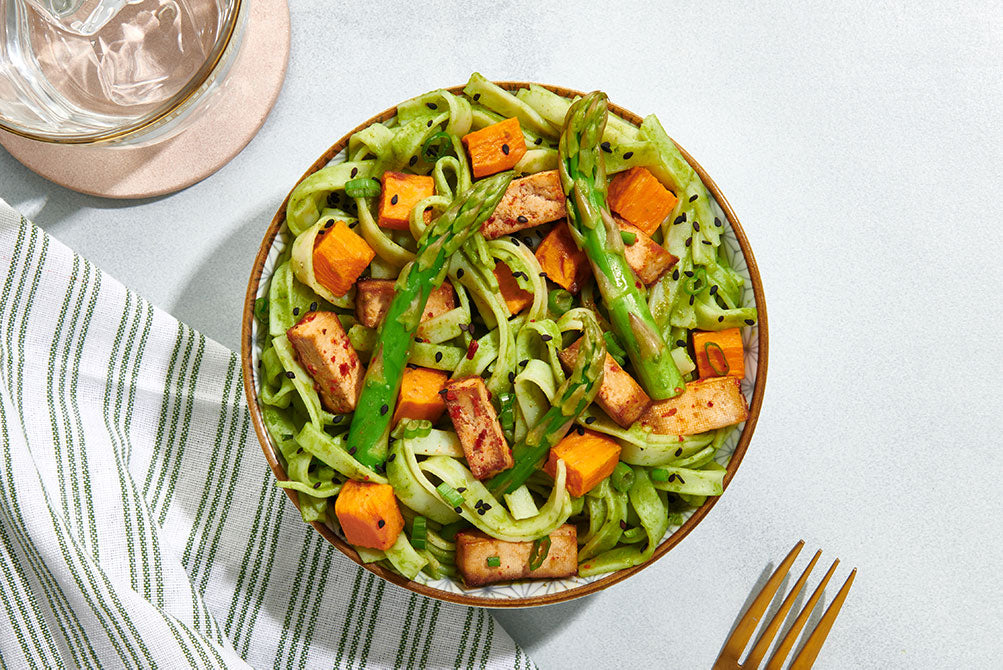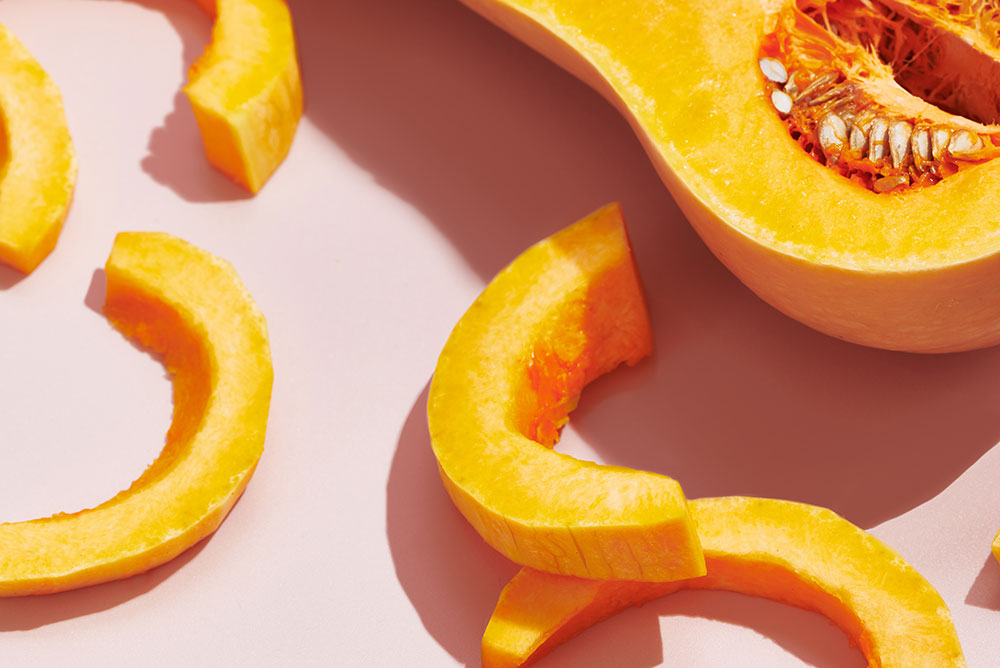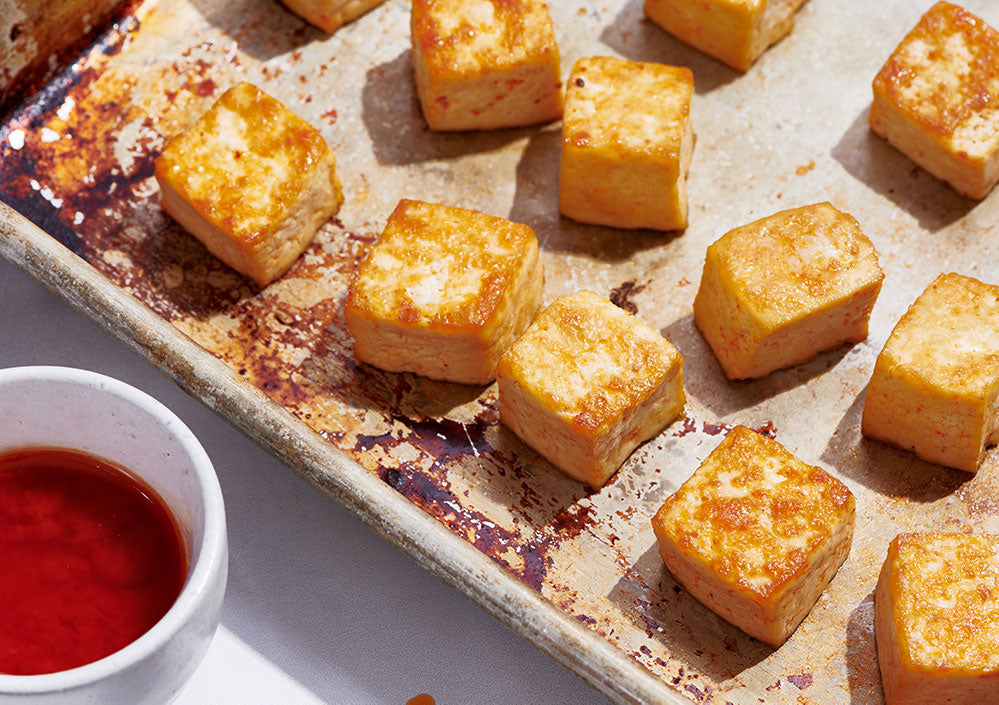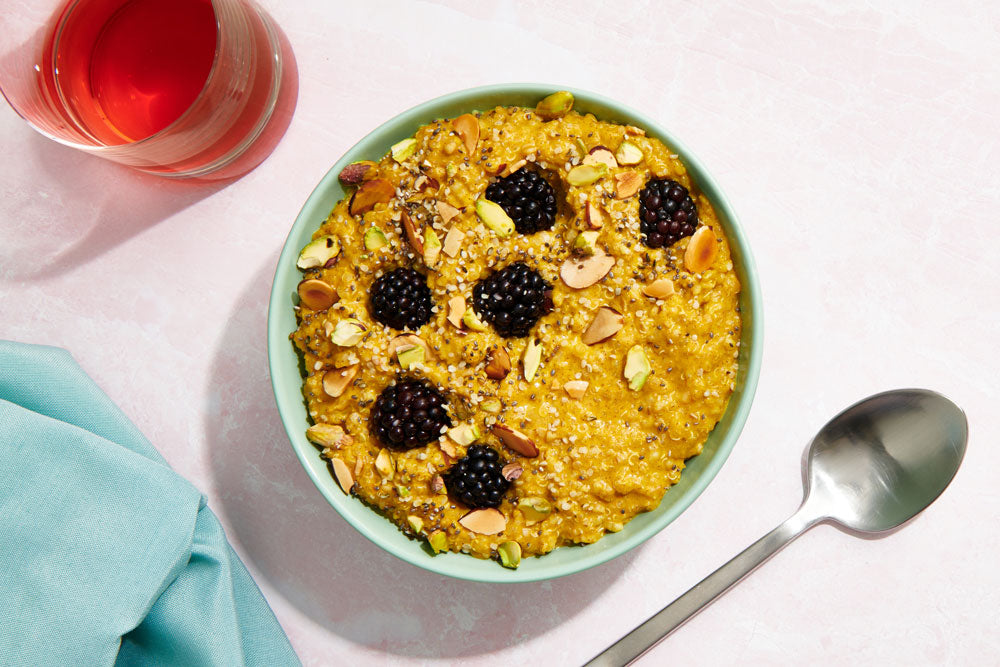The Ultimate Guide To A Plant-Based Diet
Considering starting a plant-based diet, but not sure where to begin? This comprehensive guide will teach you everything you need to know.


Call the press: plant-based diets are about to win Glow-Up of the Decade. From Trader Joe's iconic cauliflower gnocchi to Burger King's adoption of the Impossible Burger, plant-based foods have become mainstream as people's mindsets around eating have evolved. But plant power isn't just hype. Plant-based diets are proven to have lasting health benefits, and to create a more sustainable future for all.
Are you considering starting a plant-based diet, but aren't sure where or how to begin? You've come to the right place. We've compiled all the essential information, answers to your burning questions, and helpful advice on how to get started.
The case for plant-based
In the past few years, buzz-generating documentaries like What the Health, The Game Changers, and Cowspiracy have led to an explosion of plant-based awareness and curious newcomers to the plant-based community. Money talks, too — a report issued by the Plant-Based Food Association and Good Food Institute last year found that U.S. sales of plant-based foods increased by 11 percent, outgrowing other grocery categories by 5x.
But plant-based diets are more than just a media or consumer craze. In fact, the research on plant-based diets has been around for quite some time. In the 1980s, researchers embarked on the China Project, a decade-long study that examined the connection between nutrition and chronic health conditions like heart disease, diabetes, and cancer. Considered one of the most comprehensive nutritional studies ever done, its findings were published in The China Study in 2005, and confirmed the beliefs many vegans and vegetarians already held dear: that plant-rich diets lead to longer, healthier lives.
Since then, the American Cancer Society and the World Health Organization have published findings confirming the link between eating processed meats and cancers, while leading nutrition and food research experts have formally advocated in favor of plant-forward diets. Add to that growing concerns around the meat industry's carbon footprint and the virality of news on social media, the case for plant-based has never been stronger.
But what is a plant-based diet, anyway? The term seems to mean different things to different people, and you'll get varying explanations depending on who you ask. Let's dive in.
What is a plant-based diet?
A plant-based diet can mean different things for different people. For some, it means a strict diet that contains no animal products, while for others it means eating plant-centric foods, with some limited consumption of dairy or even meat. Generally speaking though, a plant-based diet consists of fruits, vegetables, whole grains, legumes, nuts and seeds, herbs, and spices, with the mindset that the more you fill up on plant-based foods, the less room you'll have for meat, poultry, dairy, and the like.
Plant-based vs. whole food plant-based
Under the umbrella of plant-based eating is a whole food plant-based diet, which focuses on eating foods that are minimally processed and as close to their natural form as possible. A simple way to think of it: Can you find it in the produce section? Whole food. Sold in a box or bag? Likely not a whole food.
Take potatoes for example. If you buy them as-is, they're a whole food. But head two aisles over for a bag of potato chips, and it's a different story. You now have a previously whole food that's been altered from its original state — plus possibly loaded with preservatives, flavor enhancers, and other chemicals. So while it's still plant-based, it's no longer a whole food. The same goes for grapes versus grape jelly, or apples compared to applesauce made with additives. Canned, or flash-frozen fruits and vegetables on the other hand, undergo limited processing, and can still be considered whole foods.

Why the emphasis on whole foods? A 2014 Yale analysis found that a minimally processed diet of predominantly plants is "decisively associated with health promotion and disease prevention." And, whole plant foods are packed with phytochemicals, a nutrient found only in plants that's known for its high antioxidant levels and disease-fighting properties. When foods are refined and processed, they lose those original nutrients in exchange for added preservatives, artificial ingredients, or unhealthy saturated fats.
Plant-based vs. vegan
Veganism is a lifestyle or dietary choice that eliminates the consumption of any and all animal products, typically rooted in an ethical desire to do no harm (by the way — check out our Beginner's Guide to a Vegan Diet for more information on veganism). While vegans do often adopt a whole foods plant based diet, whole-foods-plant-based and vegan mean different things, because vegan diets are not necessarily restricted to whole foods only. Therefore, a vegan might be open to consuming more processed foods (we're looking at you, buffalo seitan wings) than somebody following a whole foods plant based diet.
Additionally, it's worth noting that veganism eschews the use of animal products anywhere. Truly strict vegans will eliminate foods such as non-organic sugars and maple syrups from their diets, because these products are often processed using animal products (conventional sugar, for example, is bleached white using animal bone char). And beyond food, they'll also avoid purchasing and wearing accessories made from leather and fur, because these products are made from animals.
Mosaic's take
As mentioned earlier, a plant-based diet can mean something different for every individual. At Mosaic, we believe in a non-judgemental approach to plant-based eating — one that emphasizes conscious consumption over strict requirements on what you can or can't eat. Simply put, we know eating plants is great for you, and for the earth, so why not make it a bigger part of our meals? Even if that means dairy, or even some meat gets included in your diet, the important thing is that you're aware of what you consume and the impact it has on the world. Something is always better than nothing.
For the sake of total clarity, when we list our meals on our site, we use a ![]() icon to denote vegetarian choices (that may still contain animal products like cheese and eggs), and a
icon to denote vegetarian choices (that may still contain animal products like cheese and eggs), and a ![]() icon to denote vegan choices that are strictly vegan and don't contain any animal products.
icon to denote vegan choices that are strictly vegan and don't contain any animal products.
Phew! Now that we've clarified what 'plant-based' actually means, let's get into the good stuff — why it's good for you and good for the planet!
The benefits of eating plant-based
Eating a plant-rich diet can reap huge benefits when it comes to your health, and for the environment. Below are just four reasons why eating more plants is a good idea:
Load up on nutrients
Fiber and phytonutrients are critical for our health, and are found exclusively in plant foods. Fiber is crucial to the body's digestive, cardiovascular, and immune systems, while phytonutrients have immunity-boosting effects that are shown to fight inflammation, slow cancer cell growth, and lower blood pressure.
In addition, plant foods provide nearly every essential nutrient the body needs: protein, omega-3 fats, calcium, iodine, iron, zinc, folate, Vitamin C, D, and K — you name it, plants have it. You may have heard people say that you should 'eat the rainbow', or put lots of different colors of food on your plate. That's because foods of different colors tend to contain different types of nutrients. And plant-based foods are an amazing way to add color, beauty, and balanced nutrition to your table.
Improve your health
There's strong scientific evidence that many chronic conditions can be controlled or even reversed by switching to a plant-based diet. For instance, a 2017 study found that eating plant-based significantly lowered blood pressure — so much so that researchers believe it's the most effective intervention, especially when coupled with exercise and weight loss.
Another article in The Permanente Journal urges physicians to consider recommending a plant-based diet to patients, especially those with high blood pressure, diabetes, cardiovascular disease, or obesity. It concluded that plant-based diets are cost-effective, low-risk interventions that may lower body mass index, blood pressure,and cholesterol levels, and could reduce the number of medications needed to treat chronic diseases.
Maintain a healthy weight
Studies show that plant-based diets are associated with lower weights. That's largely due to the fact that vegetables, fruits, whole grains, and legumes are a significant source of fiber, keeping you fuller longer, and preventing those unhealthy midday (or midnight) snack cravings. And, eating plant-based limits the amount of unhealthy saturated fats you might otherwise consume from meat, poultry, or processed foods.
The health benefits of eating plant-based are cyclical, and one benefit can often be directly linked to another. The perfect example: a lower body weight is typically associated with lower blood pressure; lower blood pressure equates to a healthier heart; and a stronger heart means lower risk of life-threatening conditions like heart disease, stroke, diabetes, and cancer.
Reduce your environmental impact
Eating more plants is good for the planet. Animal agriculture accounts for 25 percent of the world's greenhouse gas emissions and contributes to the destruction of wildlife habitats to make way for livestock farms and arable land to feed them. Our water resources are impacted too: producing a single pound of animal protein requires 100 times more water than producing a pound of grain protein. And a gallon of milk? It requires 1,000 gallons of water. Collectively, animal agriculture uses up over half of the world's freshwater supply.
According to some scientists, avoiding dairy products is the single biggest way to reduce your carbon footprint. While there's debate within the scientific community around exactly how much animal agriculture contributes to global warming, especially compared to fossil fuel emissions, there's one thing that's for certain: limited or conscious consumption of animal products is a surefire step towards food sustainability — and that's always a good thing.
OK, so plant-based eating is healthy. But how can you be sure that you'll get all the vital nutrients essential for keeping your body strong — protein, especially? Let's get into the details!
Plant-based nutrients
Macronutrients are essential nutrients the body needs in larger quantities to stay fueled and healthy. Scientists and nutritionists recommend that any healthy diet incorporate the three main macronutrients: proteins, carbohydrates, fat. Each one provides the body with unique nutrients, so it's important to get the right ratio of all three for a well-balanced diet. Going overboard on one or under-consuming another can have unintended effects on your body, like unwanted weight loss, low energy levels, or constant hunger pangs.
Below you'll find a breakdown of each macronutrient and how much to get of each:
Protein
Proteins are the building blocks of the body. They allow the body to grow, build and repair tissues, and help the body regulate digestion. During the digestive process, protein foods are broken down into amino acids. While there are two types, essential and non-essential, essential amino acids can only be obtained through diet. That's why getting enough protein is an important concern for many people.
Recommended amount: 20-30% of total daily calories Plant-based protein sources: tofu, tempeh, soybeans, edamame, nuts, legumes
Carbohydrates
Carbohydrates are the body's primary energy source. Carbs eventually get broken down into glucose, that then provides fuel for your muscles and central nervous system during movement and exercise. The more active you are, the more carbs your body likely needs to stay fueled.
Recommended amount: 45-65% of total daily calories
Plant-based carb sources: Quinoa, oats, buckwheat, bananas, sweet potatoes, beetroots, oranges, blueberries, apples, kidney beans, chickpeas
Fat
Fat gets a bad rap because it's the highest in calories, and certain types like trans fats and saturated fats (found mostly in red meat, poultry, and full-fat dairy) should be avoided or limited. But unsaturated fats are instrumental to a healthy diet, and serve important functions — namely energy reserve, protecting vital organs, and helping your body absorb nutrients.
Recommended amount: 20-35% of total daily calories
Plant-based fat sources: avocados, oils, nuts, seeds
Misconceptions about protein in plant-based diets
Getting enough protein on a plant-based diet is a common concern for those hesitant to make the jump. But the truth is, there are many protein-packed ingredients that contain no animal products at all.

Let's start with the basics. There are a few different ways to determine your recommended protein intake. The first is by percentage of your daily calories. The USDA recommends anywhere between 20 to 30 percent — so if you consume 2,000 calories, 400 of those should come from protein. Another method is to calculate by body weight. One kilogram of body weight equates to 0.8 grams of protein. For the pounds to protein equivalent, just multiply your weight in pounds by 0.36 (or use this nifty online protein calculator).
However, the simplest calculation may be from the USDA's most recent edition of their Dietary Guidelines. It recommends 5 ½ ounce equivalents of protein foods at the 2,000 calorie level.
Whatever metric you use, plant foods are an excellent way to get all the protein you need. To give you an idea of just how much plant-based sources provide compared to traditional meat sources, here's a look at the most common ones, listed with their recommended serving size:
| Protein Source | Serving Size | Protein Amount |
|---|---|---|
| Beef | 3 oz. | 21 grams |
| Chicken | 3 oz | 26 grams |
| Pork | 3 oz. | 22 grams |
| Seitan | 3 oz. | 20 grams |
| Tofu | 3 oz. | 8 grams |
| Tempeh | 3 oz. | 16 grams |
| Edamame | 3 oz. | 10 grams |
| Lentils | ½ cup | 9 grams |
| Chickpeas | ½ cup | 8 grams |
| Beans | ½ cup | 7 grams |
| Spelt | 1 cup | 11 grams |
| Green peas | ½ cup | 8 grams |
| Spirulina | 1 tbsp. | 4 grams |
| Quinoa | 1 cup | 8 grams |
| Ezekiel Bread | 1 slice | 4 grams |
| Chia Seeds | 1 oz. | 4 grams |
As you can see, there's a lot of ways you can meet the 5 ounce requirement through these plant sources. But don't just take our word for it — many prominent athletes thrive on a plant-based diet. Tennis superstars Novak Djokovic and Venus Williams, quarterback Colin Kaepernick, and baller Kyrie Irving are just a few of the most recognizable athletes who rely on plant power. In interviews, all of them have reported higher energy levels, better endurance, and improved performance since making the switch to plant-based.
It's the same conclusion viral docu-film, The Game Changers, came to when it debunked the misconception that meat is necessary for peak performance. In actuality, it found that plant sources of unrefined carbohydrates (oats, sweet potatoes, and bananas) are the most efficient and long-lasting energy source for athletic performance. It's the same reason why marathon runners “carb-load" before a race for energy, rather than chowing down on a T-bone.
Case in point, if all-star athletes can get enough plant-based protein to meet their goals, it's certainly possible for us regular people, too.
Commonly underconsumed nutrients in plant-based diets
While a plant-based diet is an excellent source of most major vitamins and minerals needed to live a healthy and active life, there are three nutrients that are most often underconsumed by folks eating plant-based: iron, vitamin D3, and vitamin B12. These nutrients are harder to find in plants, and many vegans and plant-based eaters will supplement their natural intake. If you're worried about a vitamin or mineral deficiency, be sure to consult your doctor — they'll be able to test your levels and recommend any supplements that may be necessary in addition to your plant-based diet.
Getting started: what to eat & who to follow
Feeling overwhelmed on how, or where to begin? Don't stress! Here are some easy ways to start a plant-based diet:
- Add more fruits and veggies in gradually: Rather than focusing on cutting foods out, shift your approach to add things in. Sprinkle some spinach or peppers into your morning eggs; spruce up your lunch by adding a side salad; or top your sandwich with some grilled veggies.
- Commit to a Meatless Monday (or Tempeh Tuesday): There's no rule that says you have to go cold turkey all at once! Start with just one designated day a week to feel what it's like to make plants the centerpiece of a meal.
- Use pre-cooked meals: Navigating plant-based recipes and ingredients can feel like a lot at first. Ease into it and slowly introduce yourself to the different possibilities available. We here at Mosaic have over 30 ready-made, plant-powered meals that make it easy and convenient to try out delicious plant-based food.
- Start with breakfast: Meat and other animal products tend to be the stars of lunches and dinners, so if you're not quite ready to tackle plant-based versions of those yet, start with breakfast! Buckwheat pancakes, tofu scrambles, or oatmeal topped with fruits or veggies are easy, filling alternatives for breakfast. Or, skip the prep work, and try one one of Mosaic's six plant-based oat bowls for a stress-free, nutritious start to the day.
- Stock up on frozen fruits and vegetables: This way, you'll always have plant foods on hand — and no excuse for why you can't incorporate a few more veggies into the evening menu!

Simple swaps for a whole food, plant-based meal
Moving from a traditional diet to a plant-based one can feel daunting ‐ and like you have to relearn how to grocery shop, cook and eat out. Our advice? Keep it bite-sized!
One of the easiest ways to kickstart your journey is to simply swap out a few everyday ingredients in your kitchen for whole food, plant-based ones. Whether it's opting for a non-dairy milk or creamer in your morning coffee, or using olive oil instead of butter, here are some small ways you can make the transition to plant-based eating more manageable.
| Instead of... | Try... |
|---|---|
| Dairy milk | Oat/Almond/Coconut Milk |
| Chicken | Oyster mushrooms |
| Egg | Flax or chia egg |
| Ground beef | Lentils, beans, chickpeas |
| Beef burger patty | Black bean patty |
| Mayo | Hummus, pesto, blended avocado |
| Parmesan | Nutritional yeast |
| Butter | Olive oil |
| Ice cream | Blended bananas with fruit and cocoa powder |
| Sugary Cereals | Oatmeal, granola |
For a more comprehensive list, check out our Guide to Vegan & Vegetarian Ingredient Replacements.
Plant-based meat alternatives
With a growing awareness of climate change and the harmful effects of meat production, more people, including omnivores, are experimenting with meatless “meats" out on the market. From burgers to sausages to even deli slices, plant-based companies have done some groundbreaking work in creating meat alternatives that look and taste close to the real thing.
While seitan, tempeh, jackfruit, and tofu-based alternatives are longtime veterans in the field, companies like Field Roast are getting even more innovative by creating plant-based versions of breakfast sausage links; Beyond Meat has meatballs and beef crumbles perfect for pasta or tacos; and of course, Impossible has taken the public by storm with their plant-based “bleeding" burger, with both Beyond and Impossible getting their products not only in grocery stores but on restaurant menus.
While of course these meat alternatives aren't whole foods, they're a great way to ease into plant-based with options that can make the transition feel a little less foreign.
Easy plant-based recipes
There's no need to reinvent the wheel when it comes to cooking. You can find tons of delicious recipes from plant-based food blogs and chefs. To start, here are a few of our favorite recipes whipped up by Mosaic's very own head chef, Christine Malanga:
- Cranberry Cinnamon Oats: Make a tasty morning meal of homemade oats topped with cranberries, pumpkin seeds, and cinnamon. Even better, it's the exact same recipe we use for our Cranberry Cinnamon Oats Bowl sold on the site.
- Summer Dips: This trio of refreshing salsas is a fun, easy way to dip your toe in plant-based snacks.
- Mediterranean Tofu and Kale Salad: A simple, delicious, and nutritious salad seasoned with parsley, dill, and olives.
- Savory Oatmeal with Pecorino & Swiss Chard: A hearty, veggie-studded oatmeal that's just as good for lunch or dinner as it is for breakfast.
- Homemade Vegetable Stock: Use this flavorful roasted vegetable broth as a delicious base for soups and stews.
- Vegetarian Thai Yellow Curry Soup: Fragrant, fresh and comforting, this veggie soup has a hearty umami boost from mushrooms and rich Thai flavors.
Celebrity plant-based advocates
Aside from world-renowned athletes, many celebrities also advocated for a plant-based diet. Here are just a few:
- Natalie Portman: Natalie Portman is a vocal vegan of 9 years who regularly uses her platform to advocate for plant-based eating, including highlighting vegan chefs and recipes on her social media.
- Ellen Degeneres: While she was a vegan for 8 years, Ellen now subscribes to a plant-based diet that includes fish and eggs. However, in many interviews, she's stated that going vegan was the best thing she did for her health.
- Ariana Grande: The singer is a long-time vegan who has stated she's a firm believer in eating a full plant-based, whole food diet. She focuses her own meals around macrobiotic foods like brown rice, oats, fresh veggies, sea vegetables, and miso.
- Bill Clinton: The former president attributes a plant-based vegan diet to helping him control his heart disease and health. He's now a vocal advocate of plant-based eating, and encourages others to make the same changes for their health.
- Will.I.Am.: The Black Eyed Peas vocalist is a diehard vegan who cites health, environmental reasons, and compassion for animals as his motivation.
- Simon Cowell: After a health scare in 2017, the infamous vocal judge went vegan, shedding over 60 pounds.
- Lewis Hamilton: Seven-time Formula One Champion Lewis Hamilton has been a vegan since 2017. He frequently promotes environment and animal welfare issues to his 30 million followers on social media, and encourages fans to go plant-based with him.
- Miley Cyrus: Cyrus was a strict vegan for 6 years, but like Ellen, recently reintroduced fish into her diet as well.
Plant-based resources and reading
Lifestyle changes take time — so don't feel compelled to do everything overnight. Eating plant-based doesn't have to be an 'all or nothing' approach, and any small step you take makes a positive impact on your health and the environment. Below are some helpful resources and reading that can help you learn more information and ease your way into a plant-based diet:
- The Game Changers: Brought to you by Hollywood and sports all-stars, including James Cameron, Arnold Schwarzanneger, and Chris Paul, The Game Changers provide meal plans, recipes, and helpful advice to make the switch to plant-based easier.
- The China Study: Written by nutrition researcher Colin Campbell, the book shares the findings from the one of the largest comprehensive studies of human nutrition ever conducted. Through a partnership between Cornell, Oxford, and the Chinese Academy of Preventative Medicine, researchers collected data over a span of 20 years and discovered a simple, yet revolutionary takeaway on the power of plants.
- Eating Animals: Part memoir and part investigative report, the book examines the morality of vegetarianism, farming, and why we eat certain foods that we do. The LA Times called it "a must-read for anyone who cares about building a more humane and healthy world."
- The Food Revolution: Want to know more about food's impact on the environment? Author John Robbins exposes the dangers of the factory farming system and its negative impact on the earth. Backed by over 20 years of work and research, the book makes a compelling case to approach our eating habits with intentionality, not only for our health but for the health of the world we live in.
FAQs
How do I know if a plant-based diet is right for me?
You won't — until you try! Many people report increased energy, lower cholesterol, better digestion, and weight loss, among other health benefits, after starting a plant-based diet. For others, it aligns with their personal principles around environmental impact and animal rights.
Is eating plant-based the same as eating vegan?
While there's certainly some overlap between the two diets, there are a few differences. Vegans avoid all animal products not just in food, but clothing, shoes, etc. Being vegan doesn't necessarily mean eating only whole plant foods, although many choose to. Technically, some refined and processed foods can be considered vegan, but not plant-based. A whole food, plant-based diet on the other hand, eliminates or reduces animal products and processed foods and focuses on eating plant foods as close to their natural form. Check out our vegan diet guide for more information on veganism.
Can I eat out on a plant-based diet?
Absolutely! Many restaurants are happy to accommodate plant-based diners, and with more people going that route, many are already well-versed in altering their existing menu options for those who want it. You can also call ahead or check out the menu online beforehand to give yourself some planning time. There are even vegetarian fast food options available for those who want them — though we always recommend sticking with whole, unprocessed foods whenever possible!
Isn't it more expensive to eat plant-based?
It doesn't have to be. Nutrient-dense staples like whole grains, legumes, and fresh produce go a long way, while cans of beans and chickpeas are much less expensive than meat — and they're super easy to build meals around. Another great hack is to buy your fruits and vegetables frozen. Not only are they cheaper, but they'll last in your freezer as long as you need them too. Avoiding pre-packaged plant-based foods like soy patties or meatless meats is also a way to save, as these tend to be more expensive (not to mention more processed).
Will I get enough nutrients, especially protein, eating plant-based?
Whole plant foods contain all the nutrients we need, with the exception of a few listed below (which you can get from fortified plant-based foods or a supplement). As for protein, there are tons of plant foods with naturally high protein content. Eating a variety of high-protein plant-based foods can easily get you to your recommended daily intake.
Do I have to take supplements if I'm on a plant-based diet?
On any diet, be it traditional, plant-based, or otherwise, some micronutrients can get overlooked. If you think you have a vitamin or mineral deficiency, ask your doctor to check your levels and consult them about any recommended supplements. While plant foods provide ample nutrients, these are micronutrients that you might want to consider supplementing on a plant-based diet:
- Vitamin B12
- Iron
- Calcium
- Vitamin D
Think you're ready to start a plant-based diet? We here at Mosaic deliver chef-cooked, ready-to-heat plant-based meals right to your door. Our veggie bowls (with both vegan and vegetarian options!) are perfect for a plant-powered pick-me-up at lunch or dinner, while our oat bowls make it super simple to squeeze in a healthy breakfast or snack. Get started today and take the first step on the road to your new plant-based lifestyle!

Comments